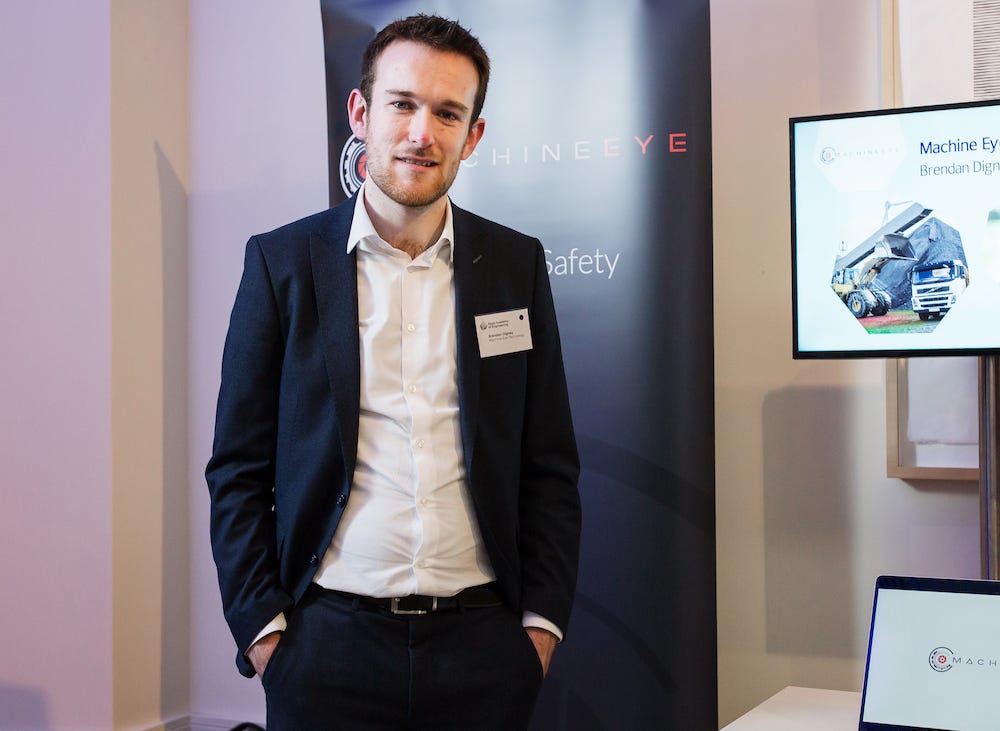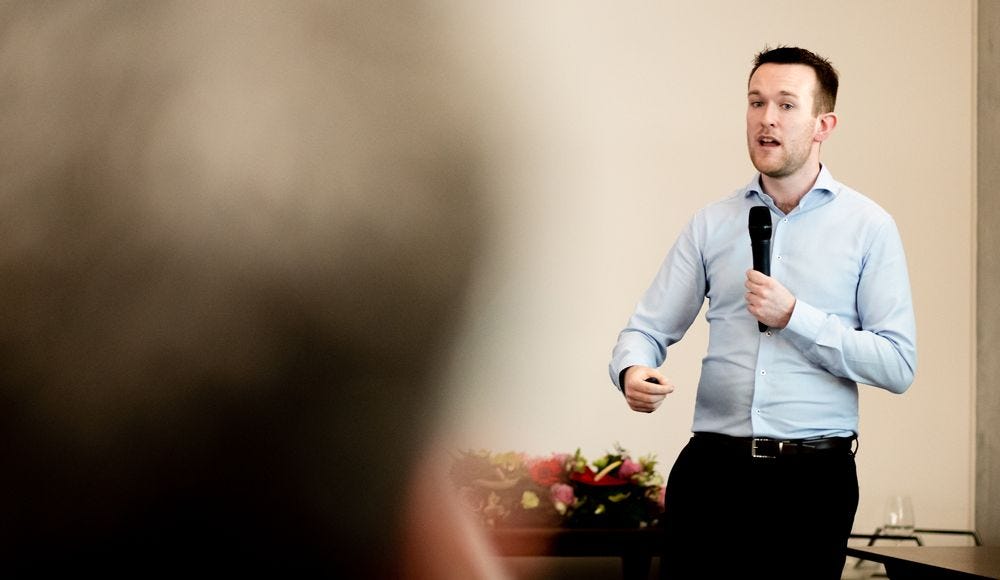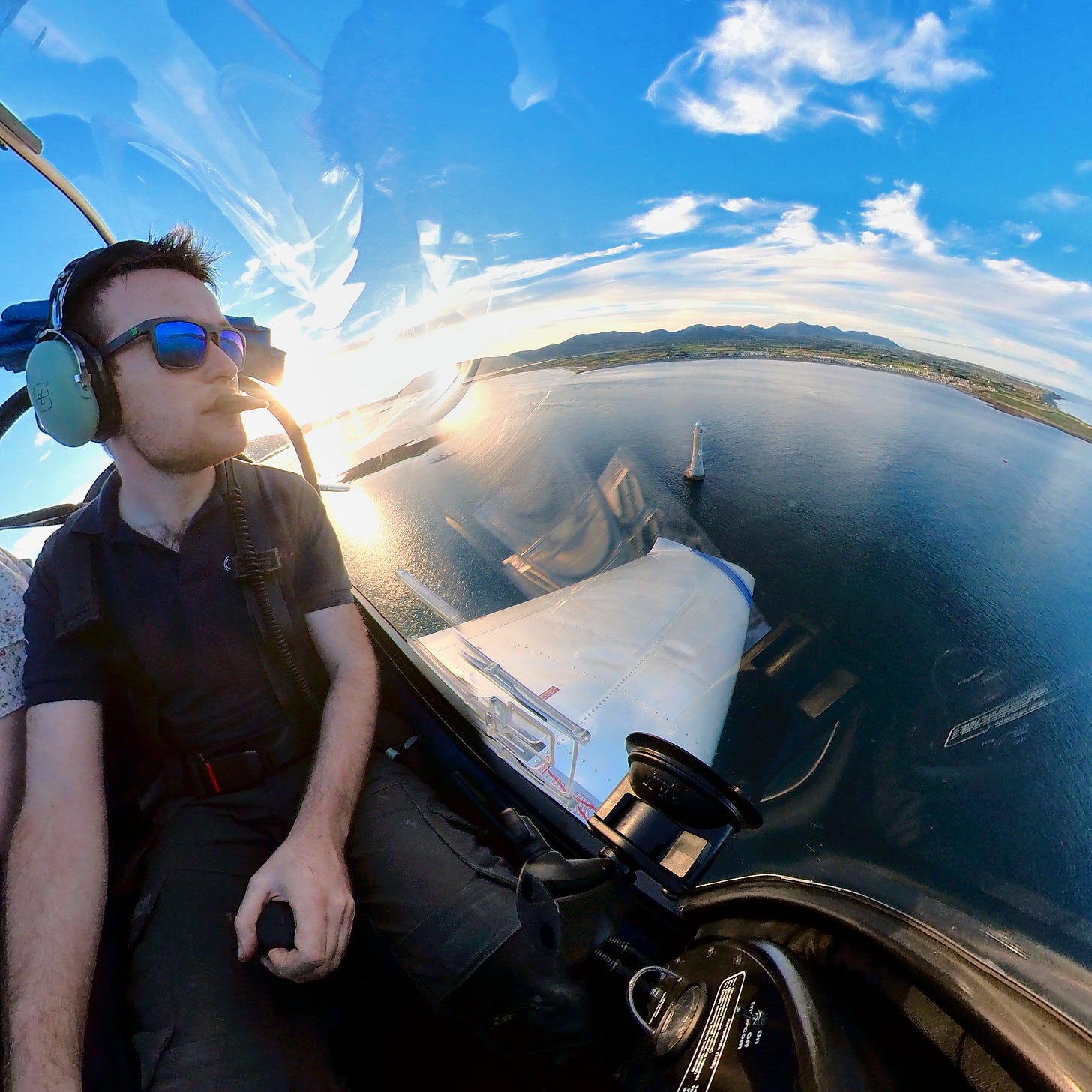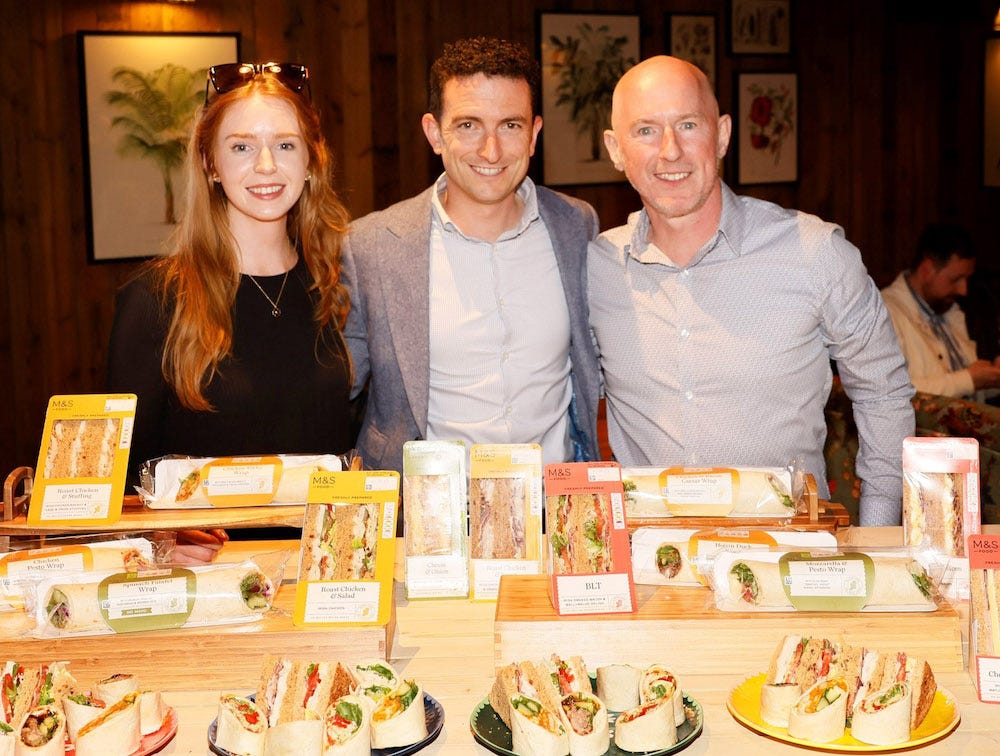'Tesla for tractors' - meet the entrepreneur using AI to save lives on the farm and on site
Brendan Digney, from Newry, started Machine Eye in 2018 with the goal of truly making an impact on the world
“It depends what day of the week you ask me; there are days of the week I'd say this is the best idea ever and there are days of the week, I'll say, ‘what am I doing?’”
It’s perhaps a common response for any person who decides to throw themselves into building their own business, and it’s no different for Co Down entrepreneur Brendan Digney, who launched Machine Eye in 2018.
The 27-year-old, who hails from Saval – a rural area of Newry where decent internet tends to be a luxury – is a Queen’s University electrical engineering graduate.
That’s the simplified introduction to a young man who is passionate about what he does and how it could help save lives across the world. He’s captivating when he speaks about the potential of young people and businesses on our own doorstep; absorbed in the idea of making Northern Ireland a better place for start-ups like his.
Before we jump into that, we have to ask the obvious question: What is Machine Eye?
Brendan, who has probably answered the question on more than one occasion when pitching for investment, explains it as the provision of tools to support the creation of safer environments in the primary industries. In layman’s terms – “Tesla for Tractors”.
It’s a form of artificial intelligence that uses computer vision to make manned heavy plant machines safer to operate and work around.
“Taking the example of a loading shovel,” Brendan explains. “It has very large blind spots, it moves quite fast and it's operated by somebody who will be on it for an extended period of time. They're often performing fairly repetitive tasks in terms of loading material, often within confined areas, so there's a significant risk posed by that loading shovel to pedestrians. One risk comes from visibility. One risk comes from psychology… computers don’t fatigue.”
Machine Eye’s technology assists the driver and alerts them to potential risks. It’s a similar safety technology used by Tesla – it’s a camera-led driver assistance technology aimed at ultimately saving lives. Similar to lane assist on most new cars.
Brendan admits his company are “only scratching the surface” as the world of technology moves at a speed never witnessed before. In terms of research into the field, “you could throw money at it” and for Brendan, running a business, “that's always the biggest challenge, trying to restrict spend and work within our budget for you could just go down a very deep hole”.
He adds: “The technology is exciting and it's the future. Give it 10 years, this sort of stuff won't be an optional extra, this sort of stuff will be standard on every digger, on every tractor, on every forklift in every country in the world because that is the direction of travel, it creates a safer workplace and makes more efficient machines.”
Brendan has always had an interest in machinery – like many children growing up in the countryside. His interest turned more to curiosity, which soon turned into him being able to strip things apart and build them up again, admittedly, with varying degrees of success over the years.
Brendan launched the company in 2018 while he was still at university. He had two years left and this business, which now employs seven people, was “just something in the background”. He graduated in late 2019 and went full time in January 2020, when it was vital to get in front of people with his idea…
“So Covid then arrived three months later and that really helped with that,” Brendan quipped.
“I was very lucky in that being a graduate I didn't have the same sort of overheads and responsibilities you would have had as a larger business. So it was possible to put my head down and work away and just come out the other side.”
For Brendan, there was no masterplan; there was no route to success already mapped out.
“There's a lot to be said for going with a flow, taking an opportunity as it comes,” he said. “Some of the best experiences I've had, or some of the best opportunities I've had, haven't been planned, they've come from a conversation, or a phone call, asking ‘what are you doing tomorrow?’ So I think you have to be somewhat fluid in your outlook, and just go with things as they present themselves to you.”
Machine Eye was always more about solving a problem than making money and that ethos remains five years on, even if the reality of commercial success underpins the future of the company.
Said Brendan: “There was never a case of, 'oh, somebody isn't doing this, there's a huge business opportunity there', it was always motivated by 'somebody isn't doing this, this technology is coming along and it can have an impact’. The driving factor for us is impact.
“If you have technology here which can do good for people, you have an obligation to run with it, you have an obligation to get that technology into people's hands.
“Of course, we're not a charity, we're a business and we have to make money. We have to have that commercial drive, but in terms of a motivating factor, it’s knowing what we do can help other people.”
While the business – any business – is underpinned by its commercial success, Machine Eye could not simply start without a cash injection. A bootstrapping graduate was not going to cut it. That injection came in through Invest NI’s Ignite programme, which has now been axed, much to Brendan’s bemusement.
“You could directly map to Northern Ireland's GDP, what was coming out of Ignite. Even though they only picked up a small number of businesses, the inward investment that came to Ignite businesses, because of the training and because of the innovation, and because of the businesses that they were, was phenomenal.”
The programme, with a guaranteed stipend, enabled Brendan to jump start his business.
“It wasn't a big stipend but it was enough that you could focus for six months on a business (it was a six-month programme). You got given your co-working office space paid for; you got given tailored mentoring, access to people with experience, access to people who had come back from London, from Dublin etcetera.
“You had four or five meetings a week set up with investors from overseas, people who got it, people who wanted to invest in new business… you had that hand holding, teaching you how to run a business and how to get off the ground. I was coming out of university as an engineer, I wasn't coming out as a business person, so I needed that education and that was great.”
Getting in front of the right people with a lot of influence, and who understand technology, has been a big part of Machine Eye’s success to date – it’s a huge piece of the puzzle to solve in business, but for Brendan, there’s not enough angel investors in Northern Ireland – it’s something he’s passionate about shining more of a spotlight upon.
“We need far more people angel investing; we have people who have been very successful business people in Northern Ireland. We have people who are here, who are local, who are indigenous, who need to be investing in the next generation of companies; they need to be getting that knowledge, getting that awareness, stepping forward because until you get your angel investors, you won't get any of the higher tiers of investment.
“You need an angel coming in first, at an early stage putting that initial cash boost into a company to get it into the institutional levels, the VC levels, upwards. That will then create more of an ecosystem here – we currently don't have enough of that.”
For Brendan, it’s vital that it’s an ecosystem that works right across Northern Ireland, beyond Belfast’s Westlink and west of the Bann.
Brendan’s hometown is Newry, and while he knows what he is working on is not a product for Newry, that shouldn’t stop him operating out of the city – but he can’t! Machine Eye is headquartered in the Catalyst Innovation Centre in Belfast. In his opinion, Newry simply isn’t set up to allow start-ups to properly compete.
But Newry isn’t short of its success stories – Brendan just wants to see more of them. He cites the example of STATSports, based at Drumalane Mill.
“There's a company built in Newry that has literally created the world of sports analytics effectively,” he said. “They defined a product, a category, a market, and they're doing it better than anybody else.
“The late Brian Conlon of First Derivatives once said ‘California had Silicon Valley, and Newry has Silicon Canal’. We have the talent but why do we not have more businesses?
Brendan believes the talent, when they decide to move on from major companies like STATSports and First Derivatives, should be coming out and creating the next round of start-ups in Newry, that “those big organisations become incubators for talent”.
“Why can we not create that here? Why can we not say to people, there is an ecosystem, there are supports, you can take a risk, you can come out, you can start something and bring all that talent out and get the whole thing cycling, circling and with time that will build the right ecosystem to help new business thrive.
“I'm a huge proponent for doing things here. I'm a huge proponent of getting out of Belfast, and west of the Bann, to Newry, to Armagh, Enniskillen and Omagh but yet I'm sitting here in Belfast because we don't have an ecosystem outside of the city to support new tech startups.”
Brendan has an ambassadorial role with of the Institute of Directors (IoD) in Northern Ireland and part of his cornerstone objective is to spark this sort of conversation, raise awareness of the need for new business support in these areas.
Co-working space is vital to harnessing that eco-system. “It's not just about here's a room go sit in it, it's the people and the culture and the environment that goes around it.”
Machine Eye is not a big organisation but it has big ambitions, therefore, it has to compete against larger businesses for talent.
Being at Catalyst in Belfast, where there are other businesses, on-site facilities, community and social events within the hub, it creates a wraparound package that, as Brendan explains, “somebody can come and work for a startup, but still have the same experience, culture, and parts that go with being in a big business”.
“And that helps make us competitive in the labour market, which we could not do if we were in a room in Newry; if we could even afford a room in Newry. Whereas what I would like to see is this sort of ecosystem, this sort of experience in Newry, in Armagh, Enniskillen and Omagh, in places that are bustling with entrepreneurs, bustling with ideas, where there isn't that support system in place.”
While he’s fighting the good fight for the smaller hubs of Northern Ireland, Brendan has his own job at hand. Being an engineer is one thing, a business owner, another thing altogether. He describes himself as “the solver of the problems and finder of money”.
“I'm an engineer who's had to become a marketer, who's had to become an accountant, who's had to have a crash course in tech investment. You know, people don't give you parts for free. Staff don't work for free, the money has to come from somewhere and we're in the world of startup. So we're in the world of startup investment; that's a completely different world than any other one I've been in before and that's one that has to be navigated.”
Brendan has been fortunate enough to be among one of the first ever graduates from Northern Ireland to be given a fellowship at the Royal Academy of Engineering in London. That was a game-changer in terms of the doors it opened and the investment it presented. Not only that but the training the Academy provided.
He said: “Their training was specific to, ‘Okay, we know you're an engineer, we know you can do XYZ and we also know you probably don't know your way around a PnL (profit and loss) statement, let’s fix that.”
And it certainly has fixed it for Brendan but there’s still a long way to go yet; he’s still a man who wears many hats.
“The phrase ‘that's not my job’ shouldn't be in your vocabulary. If something needs done, you go and do it. If it moves the business forward and brings money in the door, whatever the case may be – within reason – go on do it.”
A man of many hats inside his own company and a man of many talents outside it too. How does Brendan Digney spend his downtime? Well, it’s more like uptime! He flies his own microlight aircraft.
“I fly as often as I can although the weather in Northern Ireland kind of dictates how often. It's something I've always had an interest in, it's something I've always enjoyed.
“If you go flying, your mind is entirely focused on the task at hand, you're not thinking about a meeting earlier, you're not thinking about what you're doing tomorrow, you're solely focused on the flight, so it's a very, very good destresser.”
Maintaining aircraft is vital and something Brendan is meticulous about. Of course, he has stripped, redesigned and rebuilt his own microlight.
Oh and when he’s not flying he can be found behind a camera snapping events – he’s a photographer for hire too!
“If I'm getting paid for something that I can do well elsewhere – and it takes the pressure off this business – then brilliant.”
His paid work outside Machine Eye meant Brendan didn’t have to draw a salary from his company – he didn’t have to rely on the business from Day One.
“I could have that wee bit of breathing space that, when there was a salary in it, it didn't have to go to me, it could go towards getting a second engineer to do more work, in order to move the whole thing forward.”
Photography and Machine Eye are inextricably linked. It’s the science of cameras which Brendan ultimately specialises in – it all stems from photography.
“And at the end of the day we have all the equipment to run our own marketing team. We are very, very efficient in how we run the business.”
Efficiencies are something Brendan is still trying to improve though and that includes creating “periods where I'm turning the phone off and I'm turning the emails off to get a chance to actually work – as opposed to talking about work”.
His days were becoming more fragmented with, perhaps, less important work and distractions so he decided to ring-fence his days which has allowed him to claw back time and complete tasks much quicker.
And as the leader, Brendan is always looking at ways to make things better while fostering the right sort of culture – a culture very much focussed on people with all sorts of different qualities.
“We have people here who have joined out of university and we've effectively nurtured and grown them into the type of people we believe they can be, but also the type of people that we need.
“Then we have people who are very experienced and who are coming in from other companies with different approaches, different cultures, different experiences, and we want to, as a new business, be taking best practice from from their experience. Everybody is encouraged to challenge assumptions, approaches, decisions, and to speak up.
“It's not for me to put words in their mouths or answers in their mouths. They're not here, just to perform a task, they're here because they've got very good experience, very valued knowledge – they're very good people.
“We have a company that's built around helping others doing good for people, creating positive outcomes for people, so it wouldn't make sense for us to do anything but embody that in our staff, and in our team. It’s people centric culture.”
You can find Brendan on LinkedIn here. If you’re an entrepreneur and want to get involved you can reach me on LinkedIn here.
Job News
Newry firm Around Noon secures M&S own label supplier approval
Newry firm Around Noon, the award-winning food-to-go manufacturer, has secured much-coveted M&S own label supplier status in a major endorsement of the company’s commitment to quality from one of the most trusted brands on the high street.
Previous Issues:
Chef forced to give up career on health grounds now cooking up a storm with her own business
Succession: The daughter who turned dad's 40-year plant hire firm into a thriving business
This Co Armagh man is using artificial intelligence to revolutionise prosthetic devices










